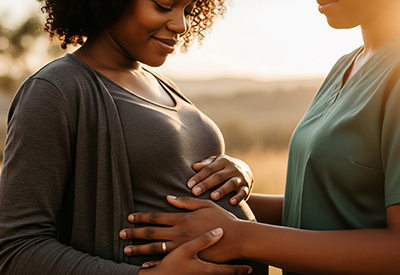
By Keshia Alphabet, Guest Columnist
Every few months, a new report drops like clockwork—telling us that Black women are three to four times more likely to die in childbirth than white women. And frankly, many of us are tired of hearing about our own deaths as if they’re a data point, not a crisis.
But what if the solution isn’t just more studies, more panels, more politicians spotlighting the problem, but rarely follow through with solutions?
What if the answer is something our grandmothers already knew?
_____
Midwives and Doulas: The Village We Left Behind
Before the sterile hospital gowns and assembly-line births, Black women were delivering babies with the help of midwives—Black, wise, unlicensed in paperwork but licensed in spirit. They knew herbs, they knew the body, and they knew the woman—not just her due date.
Doulas were part of that lineage too. They were birth witnesses, spiritual anchors, and emotional armor.
Somewhere along the way, we were told to trade that in.
Hospitals said, “We got it from here.”
But they didn’t.
_____
The Wound of Distrust
Let’s be honest—some of the resistance to midwives and doulas isn’t just about access.
It’s about trust.
We’ve been trained to second-guess our own.
Taught that if it doesn’t come with a white coat or hospital badge, it’s risky.
We side-eye Black midwives but don’t blink at strangers slicing us open in delivery rooms.
We dismiss doulas as “extra” but trust systems that silence our pain.
Some of that distrust is generational.
Some of it is survival.
But a lot of it is conditioning—the quiet message that our care isn’t as “qualified,” even when the outcomes say otherwise.
That’s the trick of the system:
It breaks us, then convinces us our own can’t fix it.
But we weren’t meant to do this alone—or in fear.
We were meant to be held, seen, and heard by people who understand the weight of our bodies and the worth of our lives.
_____
The Numbers Don’t Lie—But They Do Point
According to the CDC, 84% of pregnancy-related deaths are preventable. That’s not a typo. That means the vast majority of mothers who die during or after childbirth could still be here—laughing, healing, nursing, raising.
Here’s what’s killing us—plain and simple:
- Pain being ignored
- No follow-up care
- Providers who don’t listen or relate
- Zip codes with no real care
But research shows when doulas and midwives are present, outcomes improve—especially for Black women.
- Fewer C-sections
- Lower rates of preterm birth
- Stronger maternal mental health
- Higher birth satisfaction
In fact, studies show that community-based midwifery and doula support can cut racial birth disparities in half.
(Sources: Open Arms Prenatal Service, PMC Study)
What They Offer That the System Can’t
Midwives and doulas do something hospitals struggle to deliver: presence.
They stay.
They listen.
They speak up when you’re too weak or too weary.
They advocate when the IV is in and the fear sets in.
Midwives bring medical care with compassion.
Doulas bring emotional care with understanding.
Together, they guard the body and protect the experience. And for Black mothers who’ve been ignored, rushed, or blamed—that makes all the difference.
I saw it myself. I watched my cousin give birth at home, surrounded by a midwife and a doula who held the room like anchors in a storm. Everything was calm. Everything was right. And when it was over, I cried. Because that kind of care still exists—and every woman deserves to know it. And it made me wonder why everyone doesn’t get that.
This Is A Solution That Doesn’t Wait on Congress
We don’t have to wait on a bill to pass to start trusting the people who’ve been saving lives long before hospitals had policies.
- Churches can sponsor doulas for young mothers.
- States can expand Medicaid coverage for doula care (some already do).
- Families can make midwives part of the conversation again—not just when there’s a crisis.
- Black women can ask for more than a nurse with a clipboard.
Some things we never should’ve let go of.
For the Record:
- 669 maternal deaths in the U.S. in 2023 (CDC).
- About 52–53% of pregnancy-related deaths happen postpartum—from day 1 to up to one year after birth—many occurred at home or outside hospitals ( CDC MMRC, 2017–2019; Commonwealth Fund: “Nearly two of three maternal deaths … occur during the postpartum period” (U.S. Maternal Mortality Crisis Comparison | Commonwealth Fund ).
- 35% of U.S. counties are maternity care deserts—places with no local obstetric providers or birth facilities, leaving pregnant people stranded (Nowhere to Go: Maternity Care Deserts Across the US | March of Dimes).
- 84% of pregnancy-related deaths are preventable .
We don’t need more awareness.
We need accountability.
And sometimes, the answer isn’t another expert.
Bring back the village. A woman with steady hands, a knowing voice, and a calling to bring life into this world safely.
Let’s stop reading about preventable deaths and start writing new birth stories—ones that end with joy, not grief.

